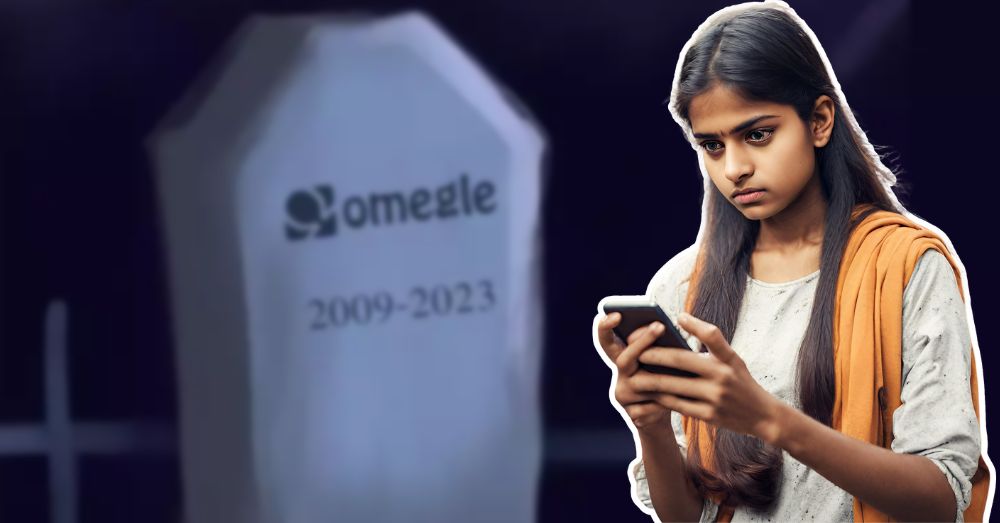Trigger warning: Mentions of child abuse
Omegle, a platform that connected strangers via video calls to foster unexpected friendships, shut down after 14 years of operation. The closure, attributed to attacks by critics exploiting the platform’s vulnerabilities, prompts us to question the depths of our society’s wickedness.
“There can be no honest accounting of Omegle without acknowledging that some people misused it, including to commit unspeakably heinous crimes,” Omegle’s founder, Leif K-Brooks, shared in a statement to announce the site’s permanent closure. The platform had faced scrutiny in recent years, being implicated in legal cases involving paedophiles targeting minors.
The final blow came with the settlement of a civil claim filed by an unnamed plaintiff who alleged that Omegle had randomly paired her, an 11-year-old at the time, with an adult man who sexually abused her for three years. This just being a single case, if not more sort of these cases used to take place daily on Omegle, out of which nearly every case went unreported. Each child abuse has a story behind it, which stays with that individual for the rest of their life.
Founded in 2009, Omegle had become a peculiar fixture in internet culture, boasting millions of daily users. Its revival during the pandemic, fueled by TikTok users sharing their encounters, ranged from quirky to confrontational, always maintaining an unfiltered sense of the unexpected. K-Brooks envisioned the platform as a space to build on the positive aspects of the internet while introducing a unique form of social spontaneity.
However, the grim reality of Omegle’s misuse casts a dark shadow over its legacy. The platform became a breeding ground for sexual predators, as evidenced by cases where individuals exploited the anonymity it provided to engage in heinous crimes. A man from Virigina US, Anthony Benton, was sentenced to 16 years in prison for admitting to chatting with over 1,000 girls on Omegle and producing explicit videos. The magnitude of such cases paints a distressing picture of the platform’s role in facilitating criminal activities. The platform’s demise brought to light the darker side of online interactions. Users recounted witnessing disturbing acts, from the live butchering of goats to bizarre pranks and rampant virtual sexual harassment.
The fourth Global Threat Assessment Report by WeProtect Global Alliance discloses an alarming 87% surge in reported cases of child sexual abuse material since 2019, totalling over 32 million global reports (NCMEC). In the realm of online threats to children in 2023, the report further unveils a staggering 360% increase in self-generated sexual imagery of 7-10-year-olds between 2020 and 2022, as reported by the Internet Watch Foundation. Disturbingly, the heightened dangers are exacerbated by social gaming environments that encourage adult-child interaction, virtual gift exchanges, and friendly turned-ugly conversations.
With the rise of AI and deepfake tools online, a video or picture can be distorted within a few seconds, resulting in vulgarity. Deepfake turns even more ugly and disturbing when used against minors. Conversations with children on social gaming platforms can swiftly escalate into high-risk grooming and lewd situations within a mere 19 seconds, with an average grooming time of only 45 minutes. Perpetrators, for monetary gains, manipulate and groom children into sharing sexual images and videos of themselves. In many cases, these perpetrators pose as young girls on the internet and approach boys between the age group of 15-17 years through social media. In some cases, this resulted in children ending up taking their own lives.
Omegle’s shutdown will be akin to Club Penguin eliciting reactions of indifference, mild dismay, or only worth mentioning that it’s a shame at best. Brooks’ fight is still happening: “The battle for Omegle has been lost, but the war against the Internet rages on.” The shutdown of Omegle won’t stop child abuse or sexual harassment on the internet in general, but there would just be a shift in the platform and ways for predators to perform (like Instagram, Discord, Reddit etc). In a country like India, where such topics are considered taboo but every teenager is now equipped with smart devices in hand along with good internet, awareness becomes a need of an hour.
Check out this short story by BBC:
